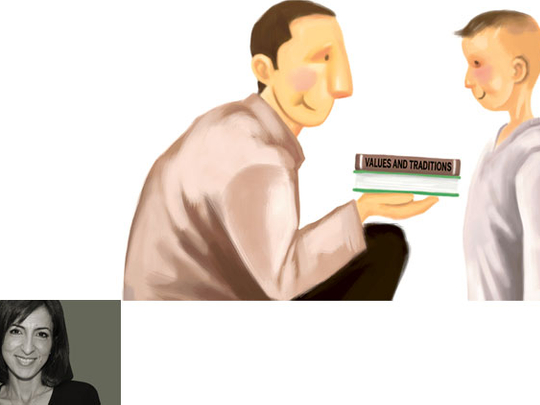
As an Arab raised in the US, the question of identity played an important role in my formation as an individual. My parents' relentless struggle was to make certain that their culture and beliefs were part of my makeup and identity in a foreign western society.
The West ignited a deep fear in their hearts. Their concern lied in the uncertainty of what could become of their children who neither fully shared their old beliefs nor were completely a part of the new culture, but were part of a third culture, an amalgam of the old and the new, one that could perhaps be thought of as a hybrid product engendered by the fusion of the different cultures.
However, it is often the case that this hybrid product is frowned upon by immigrants, regardless of nationality or background, as it insinuates the denial of traditions of their pasts to continue. Indeed, there are certainly legitimate reasons for immigrant parents to shrink away from the new culture, the Other that threatens to envelope them.
And, as they begin to realise that they are in danger of losing their old identity, many react by becoming uncompromisingly determined to preserve and renew old traditions and customs, and rigidly demand of their children to embrace convictions and practices of a past they themselves have left behind in their homelands.
Such reactions also leave negative impressions on the natives of the host country, where they are often misinterpreted as disrespectful to a local culture and as looking down on its ways of life, consequently yielding tension and misunderstanding on both sides.Certainly, all parents, immigrant or non-immigrant, naturally long to instill their views and family traditions in their children. But when it comes to immigrants especially, this effort is acted upon on a conscientious level and at times with a vigorous approach — a much more complicated task as the once familiar convictions and traditions are nowhere to be found in the new surroundings.
Yet, the reality of the matter is that evolution and change are destined to happen regardless of how much we resist them — so, the question is then, why resist them? Why not accept and celebrate the new evolved product as refined and reformed?
Resisting change
Our effort as parents to recreate and forcefully impose the past in the present is a hopelessly failed effort. Moreover, resisting change might lead to negative and reverse reactions on our children's part. We must come to terms with the fact that home to our children is belonging and familiarity.
It is not the abstract cultures of our pasts that once existed in a world very far away from their own, narrated through stories and tales, but is rather the tangible, concrete and multicultural reality in which we live at present. Our children's identity is one that agrees with their today, not with our yesterday. Why not look at the hybrid product, the fusion between the different cultures, as something beautiful, as a rich blend of cultures, taking the best from both worlds? Why can't we perceive it as a continuation of the mutual development of the old and the new, as cultural diversity that preserves the pre-given cultural components acquired from one's past and intermixes those components with present ones yielding a collective identity in a multicultural humanity?
The message here is not to imply the shedding of the past or the denial of its continuation. On the contrary, we should teach our children to take pride in their heritage and encourage them to celebrate their history — to bring their unique, original ingredients into the new mix of cultures.
Indeed, we should advance the continuation of traditions but, at the same time, while partaking in the building of bridges that can connect our own cultures with the universal human culture in which we exist today, a mosaic that celebrates the old while embracing the new.
An excerpt from Khalil Gibran's The Prophet sums up my thoughts. Without reference to a specific nationality or identity but to humanity in general, Gibran writes: ‘Your children are not your children / They come through you but not from you / And though they are with you yet they belong not to you / You may give them your love but not your thoughts / For they have their own thoughts / You may strive to be like them, but seek not to make them like you / For life goes not backward nor tarries with yesterday'.
So, let us make a genuine effort to understand our children's new identities, and let us savour the myriad of rich flavours that come with the multicoloured global humanity in which we exist today.
Ghada Al Atrash holds a Master's degree in English.









